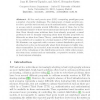Free Online Productivity Tools
i2Speak
i2Symbol
i2OCR
iTex2Img
iWeb2Print
iWeb2Shot
i2Type
iPdf2Split
iPdf2Merge
i2Bopomofo
i2Arabic
i2Style
i2Image
i2PDF
iLatex2Rtf
Sci2ools
OTM
2007
Springer
2007
Springer
Bayesian Analysis of Secure P2P Sharing Protocols
Ad hoc and peer-to-peer (P2P) computing paradigms pose a number of security challenges. The deployment of classic security protocols to provide services such as node authentication, content integrity or access control, presents several difficulties, most of them due to the decentralized nature of these environments and the lack of central authorities. Even though some solutions have been already proposed, a usual problem is how to formally reasoning about their security properties. In this work, we show how Game Theory –particularly Bayesian games– can be an useful tool to analyze in a formal manner a P2P security scheme. We illustrate our approach with a secure content distribution protocol, showing how nodes can dynamically adapt their strategies to highly transient communities. In our model, some security aspects rest on the formal proof of the robustness of the distribution protocol, while other properties stem from notions such as rationality, cooperative security, beliefs, or...
Related Content
| Added | 08 Jun 2010 |
| Updated | 08 Jun 2010 |
| Type | Conference |
| Year | 2007 |
| Where | OTM |
| Authors | Esther Palomar, Almudena Alcaide, Juan M. Estévez-Tapiador, Julio César Hernández Castro |
Comments (0)

